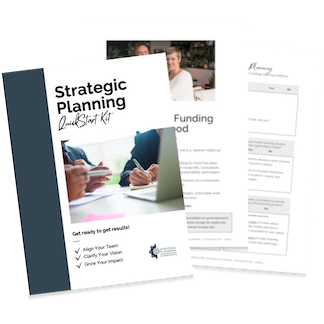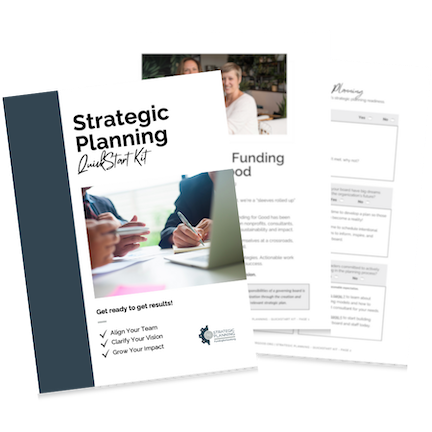In the wake of the #MeToo and #TimesUp movements, over 125 pieces of legislation on workplace harassment have been introduced across 32 states in the US in the past year alone.
Note that I did not say for-profit workplace harassment. Sexual harassment is yet another way that for-profit and nonprofit businesses are more alike than they often realize.
In both business scenarios, one might think any business would have policies that protect in place around harassment in general, but this is not the case. Many times, policies that protect are implemented only when required by law or an incident has necessitated the creation of a policy. Am I wrong? Do you know the policies your organization has in place right now?
Embezzlement – How to Avoid it at Your Nonprofit
Marie and I meet with nonprofit organizations all the time who don’t have any of the following policies in place. Which ones does your organization have and have they been reviewed/revised at regular intervals?
- Conflict of Interest Policy
- Accounting Policy
- Anti-discrimination Policy
- Anti-harassment Policy
- Anti-terrorism Policy *required by many foundations for grant submission
- Child Protection Policy
- Dress Code
- Employee Handbook
- Gift Acceptance Policy
- Hiring/Firing Policy
- Medical Emergency/Injury Policy
- Personnel Policy
- Procurement Policy
- Sexual Harassment Policy
- Social Media Policy
- Unrestricted Major Gifts Policy
- Volunteer Handbook
I was listening to NPR last week and heard of yet another nonprofit organization that was having a scandal related to a staff and a student and sexual misconduct was the issue. I immediately wondered if they had any of the pieces in place that might have prevented the situation from arising in the first place.
Harassment in the workplace harms more than its direct victims. For nonprofits, a harassment scandal will not only erode public trust, a vital aspect of an organization’s support and success, it will also demoralize employees in a way that contravenes our shared values of equal opportunity. The harm reaches beyond lawsuits and fines — it can devastate an entire organization and the communities the organization works with and serves. (Nonprofit Law Blog | Protecting Your Nonprofit from Sexual Harassment)
“It takes 20 years to build a reputation and five minutes to ruin it. If you think about that, you’ll do things differently.” – Warren Buffett
Does your organization have a culture that enforces zero tolerance for harassment?
Does your organization have policies and procedures that protect? Policies and procedures that protect your staff, donors, board members, vendors, and participants?
Does your organization provide training such as compliance, civility/sensitivity, and/or bystander intervention trainings?
If you answered no, or I’m not sure to any of these questions, I encourage you to find out. Just because it is not REQUIRED by law, doesn’t mean you shouldn’t implement these best practices.
Let’s start by answering the question, ‘What is Sexual Harassment?’
Sexual harassment, among other types of discrimination, is defined by state and federal laws. The US Equal Employment Opportunity Commission (EEOC) is the federal agency that regulates and investigates sexual harassment.
Here is how the EEOC defines sexual harassment:
It is unlawful to harass a person because of that person’s sex. Harassment can include “sexual harassment” or unwelcome sexual advances, requests for sexual favors, and other verbal or physical harassment of a sexual nature. Harassment does not have to be of a sexual nature, however, and can include offensive remarks about a person’s sex. For example, it is illegal to harass a woman by making offensive comments about women in general. Both victim and the harasser can be either a woman or a man, and the victim and harasser can be the same sex. Although the law doesn’t prohibit simple teasing, offhand comments, or isolated incidents that are not very serious, harassment is illegal when it is so frequent or severe that it creates a hostile or offensive work environment or when it results in an adverse employment decision (such as the victim being fired or demoted). The harasser can be the victim’s supervisor, a supervisor in another area, a co-worker, or someone who is not an employee of the employer, such as a client or customer.
Many state laws have their own definitions of sexual discrimination and sexual harassment and are broader than federal law because they apply to workplaces where there is only one employee.
Some states also impose special compliance requirements, such as training mandates
In the following states employees must receive sexual harassment training:
- Colorado and Vermont (applies to all employers) California and Connecticut (applies to employers with 50+ employees)
- Maine (15+ employees)
- New Mexico (secondary school employees only)
- Massachusetts’ (6+ employees).
Of note, California’s supervisors must receive training that includes awareness about ‘abusive conduct.’
Be sure to do your due diligence and check your state’s laws before drafting policies or making decisions on how to approach harassment trainings/education for your organization. (National Council of Nonprofits | Sexual Harassment in the Nonprofit Workplace)
For an excellent article with in-depth information on sexual harassment check out:
For those of you looking to learn more about trainings and education for your staff, board, and volunteers, check out Traliant. Traliant has interactive, modern and fully-customizable online courses that are designed for the modern work environment that are ever-changing to respond to current legal and cultural changes (#MeToo).
If you have worked with or followed Funding For Good for any length of time, you know I’m all about free resources I can share. I don’t like to try to sell people stuff, I prefer to have options so folks can try things for themselves, free, and then decide if it’s right for them. Luckily, with the link below, you can access a free course trial of Trailant and see what it’s all about for yourself. I’ve gone through some of the online courses for my tiny business and think you might really find it helpful as you work to grow your organization for good. Access Your Free Course Trail with Traliant
If you got what you need from today’s blog, you can stop reading here. If you want to know more about the Traliant Sexual Harassment Training for Nonprofits, I included some additional tidbits for you below.
Keep growing for good! – Mandy
Engaging and Effective Sexual Harassment Training for Nonprofits
Traliant is revolutionizing the compliance training experience with modern, bite-sized episodes served in a modern news-style format. Courses immerse learners in interactive videos that let them choose alternate endings, while learning to handle difficult, real-world situations. By influencing behavior and culture, employees learn to act ethically, speak up and prevent harassment and discrimination, and promote a positive, respectful workplace.
How We Take Training from Boring to Brilliant
“The courses were very interactive and not at all corny. I’m in HR and I never say this about “training” courses, but I was done with the hour long course before I realized it and enjoyed it. You’ve done a great job with a diverse group of actors and situations that relate to all levels in an organization.“
– Customer 2019



